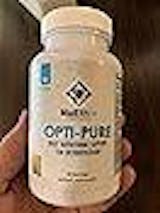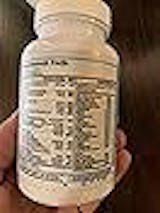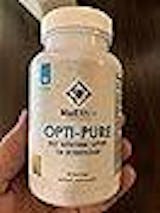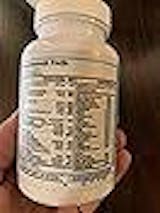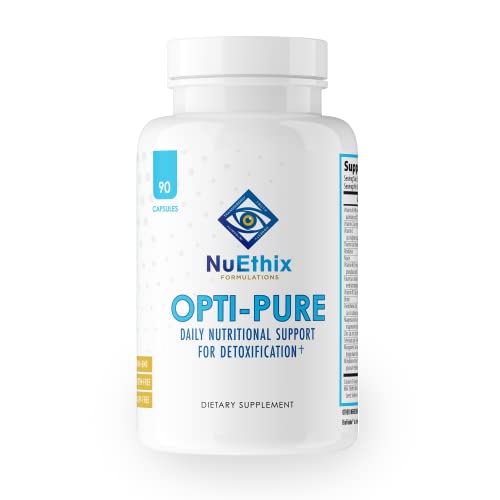
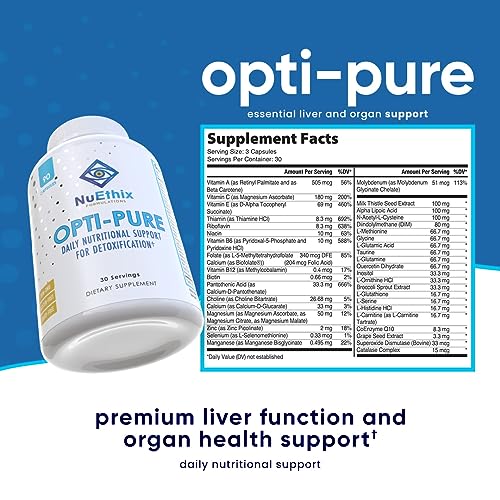
NuEthix Formulations Liver Supplement - Supports Detoxification & Liver Function - 30 Capsules


Retinol (Vitamin A)
High RiskRetinol (vitamin A) is a naturally occurring substance primarily known for its role in skin health, often included in products aimed at improving skin texture and reducing signs of aging. It functions as a potent ingredient in skincare formulations, enhancing cellular turnover and promoting collagen production.
Sustai Insights
Retinol offers functional benefits such as enhancing skin absorption and improving skin appearance through increased turnover and collagen synthesis. However, its usage is associated with high concerns regarding developmental and reproductive toxicity and potential irritation. Environmental risks include its contribution to pollution, while regulatory bodies impose strict usage restrictions. Overall, the risk level is assessed as high, necessitating careful consideration in its application and the exploration of safer alternatives.
Zinc Picolinate
High RiskZinc picolinate is a zinc salt of picolinic acid, primarily used as a dietary supplement to enhance zinc absorption in the body. It serves various roles in nutritional support, including immune function, skin health, and cellular metabolism.
Sustai Insights
Zinc picolinate offers functional benefits such as improving zinc bioavailability, essential for numerous biochemical processes. However, it is subject to regulatory restrictions due to potential health risks, including low allergenic potential and minimal developmental toxicity. Environmental concerns include its persistence and potential bioaccumulation. Overall, it presents a high risk level, necessitating careful consideration in its usage. Alternatives include other zinc forms with fewer restrictions.
Selenium
High RiskSelenium is a trace mineral essential for various bodily functions, including antioxidant activity and thyroid hormone metabolism. It is commonly found in dietary sources such as seafood, meat, and nuts. Selenium plays a role in immune function and may protect against oxidative stress.
Sustai Insights
Selenium offers functional benefits such as antioxidant properties and support for thyroid health. However, it poses health risks, including potential developmental and reproductive toxicity, though concerns about carcinogenicity and allergenic potential are low. Environmental risks include its persistence and bioaccumulation in ecosystems. Regulatory agencies have placed significant use restrictions on selenium, categorizing it as high risk overall. Safe usage practices are essential, and alternatives like zinc or vitamin E may be considered for similar benefits.
Magnesium
Low RiskMagnesium is a mineral commonly found in various products, serving primarily as a nutrient that supports multiple biological functions, including muscle and nerve function, and energy production. It is often included in dietary supplements and fortified foods to address magnesium deficiency.
Sustai Insights
Magnesium offers functional benefits such as aiding in muscle relaxation and energy production, making it an important nutrient. It is sustainably sourced and generally considered low risk, with minimal health concerns related to cancer, allergies, or reproductive toxicity. Environmental risks are also low, as it does not contribute significantly to pollution or bioaccumulation. Regulatory status is favorable, with no current restrictions. Safe usage practices involve adhering to recommended dietary allowances. Overall, magnesium is a low-risk ingredient with no significant adverse effects, making it a suitable choice in various applications.
Tocopherol, D Alpha
Low RiskTocopherol, specifically d-alpha tocopherol, is a naturally occurring form of Vitamin E. It is commonly used in cosmetic and personal care products primarily for its antioxidant properties, helping to protect formulations from oxidation and extend shelf life.
Sustai Insights
D-alpha tocopherol provides effective antioxidant benefits, contributing to product stability. It is sustainably sourced and generally regarded as safe, with low concerns regarding carcinogenicity, allergies, and reproductive toxicity. However, there are minor concerns about endocrine disruption. Regulatory bodies have not imposed significant restrictions, indicating low overall risk. Recommended usage practices include adhering to established safe concentration thresholds. Alternatives, such as other forms of Vitamin E or plant-based antioxidants, may also be considered.
Acetyl Cysteine
Low RiskAcetyl cysteine is a derivative of the amino acid cysteine, commonly used in cosmetic formulations. It primarily functions as a moisturizing agent and antioxidant, contributing to skin hydration and protection against oxidative stress.
Sustai Insights
Acetyl cysteine is valued for its antioxidant properties and skin hydration benefits, making it effective in cosmetic products. It is generally considered low risk for health concerns, with minimal potential for carcinogenicity, allergies, or reproductive toxicity. Environmental impacts are also low, with no significant bioaccumulation or pollution concerns identified. Regulatory bodies have not imposed significant restrictions, and its safety profile supports its use in cosmetics. Recommendations include adhering to established concentration limits to maintain safety. Overall, it is a low-risk ingredient in cosmetics.
Ascorbic Acid (Vitamin C)
Low RiskAscorbic acid (Vitamin C) is a naturally occurring antioxidant essential for various biological functions, including collagen synthesis and immune response. It is commonly used in cosmetic and food products for its preservative properties and ability to enhance skin brightness.
Sustai Insights
Ascorbic acid provides functional benefits as an effective antioxidant and preservative, contributing to skin health and product stability. It is generally recognized as safe with low health risks, including minimal concerns for carcinogenicity and allergies. Environmentally, it poses low risks, as it is biodegradable and does not bioaccumulate. Regulatory bodies like the FDA have not imposed significant restrictions on its use. Overall, the ingredient presents a low risk, with safe usage practices ensuring consumer safety, and alternatives such as natural extracts exist for those seeking different formulations.
Vitamin B3
Low RiskVitamin B3, also known as niacin or nicotinic acid, is an organic compound that plays a crucial role in various metabolic processes in the body. It is commonly used in cosmetic formulations for its ability to improve skin texture and enhance moisture retention, thereby contributing to overall skin health.
Sustai Insights
Vitamin B3 offers functional benefits such as improving skin hydration, reducing the appearance of fine lines, and enhancing overall skin tone. It is generally recognized as safe, with low associated health risks, including minimal concerns for carcinogenicity, allergies, or reproductive toxicity. Environmentally, it poses low risks and is not classified as a pollutant or bioaccumulative. Regulatory bodies have not placed substantial restrictions on its use, affirming its safety in cosmetic applications. Overall, Vitamin B3 is considered a low-risk ingredient, with no significant adverse effects reported. Safe usage practices include using within recommended concentrations, and alternatives like Vitamin B5 can be considered for similar benefits.
Thiamin
Low RiskThiamin, also known as vitamin B1, is a water-soluble vitamin essential for carbohydrate metabolism and nerve function. It serves as a coenzyme in the conversion of food into energy and is important for maintaining healthy nerve cells and muscle function.
Sustai Insights
Thiamin plays a crucial role in energy metabolism and supports nerve health, with minimal associated health risks such as low carcinogenicity and low allergenic potential. It is not currently subject to restrictions by regulatory bodies. While thiamin is not known to pose significant environmental risks, its production should be monitored for sustainability. Safe usage practices include ensuring adequate dietary intake, particularly in vulnerable populations. Given the overall low risk associated with thiamin, it is considered a safe ingredient in product formulations.
Magnesium Citrate
Low RiskMagnesium citrate is a magnesium salt of citric acid, commonly used in cosmetic formulations as a stabilizing agent and to enhance product texture. It aids in moisture retention and can contribute to the overall effectiveness of various cosmetic products.
Sustai Insights
Magnesium citrate serves functional benefits by stabilizing formulations and improving texture, while its low risk profile suggests minimal health hazards, including low concerns for carcinogenicity, allergies, and reproductive toxicity. Environmentally, it presents low risks as a pollutant or bioaccumulative substance. Regulatory bodies impose few restrictions, indicating a favorable status. Safe usage practices are recommended, with alternatives available such as magnesium chloride or magnesium sulfate for similar benefits. Overall, the assessment concludes a low risk associated with magnesium citrate.
Pyridoxine
Low RiskPyridoxine is a substituted aromatic compound, primarily known as vitamin B6. It plays a crucial role in various metabolic processes, including amino acid metabolism, neurotransmitter synthesis, and the production of hemoglobin.
Sustai Insights
Pyridoxine serves essential functions in metabolic processes and is vital for overall health. It poses low health risks, with minimal concerns related to carcinogenicity, allergies, or reproductive toxicity. Environmentally, it is not considered a pollutant or bioaccumulative. Regulatory bodies have not imposed significant restrictions, indicating a low risk overall. Safe usage practices are encouraged, and alternatives like other B vitamins can be considered.
Biotin
Low RiskBiotin, also known as vitamin B7, is a water-soluble vitamin that plays a crucial role in the metabolism of carbohydrates, fats, and proteins. It is commonly used in dietary supplements and cosmetic products to support healthy hair, skin, and nails, due to its involvement in keratin synthesis.
Sustai Insights
Biotin is recognized for its functional benefits, particularly in promoting hair and skin health. It is generally considered safe, with low concerns regarding carcinogenicity, allergenic potential, and reproductive toxicity. Regulatory bodies such as the FDA have no significant restrictions on its use, and it is not associated with substantial environmental risks. Overall, biotin is assessed to be low risk, making it a viable ingredient in various formulations. Safe usage practices include adhering to recommended dosages, and alternatives may be considered for those seeking plant-based or vegan options.
Magnesium Stearate
Low RiskMagnesium stearate is a magnesium salt of stearic acid, commonly used as a lubricant and anti-caking agent in pharmaceuticals and cosmetic products. It helps in the manufacturing process by preventing ingredients from clumping together and ensuring even distribution in formulations.
Sustai Insights
Magnesium stearate is recognized for its functional benefits as a lubricant and anti-caking agent, enhancing product stability. It is considered low risk regarding health concerns, including carcinogenicity and allergenic potential, with no significant environmental hazards reported. Regulatory bodies, including the FDA, have not imposed major restrictions, supporting its safe use in various applications. Recommended usage levels are typically low, maintaining safety in formulations. Overall, the ingredient is assessed as low risk, with no significant adverse health or environmental impacts identified.
Riboflavin
Low RiskRiboflavin, also known as Vitamin B2, is a water-soluble vitamin essential for energy production and cellular function. It plays a critical role in the metabolism of fats, carbohydrates, and proteins, and is commonly used as a dietary supplement and food additive for its color and nutritional benefits.
Sustai Insights
Riboflavin offers functional benefits, including its role in energy metabolism and as a food colorant. It is generally recognized as safe with low risk for allergies, carcinogenicity, and reproductive toxicity. However, excessive intake can lead to minor side effects such as yellow urine. Environmentally, riboflavin poses low pollutant potential and is not bioaccumulative. Regulatory bodies like the FDA have approved its use, establishing a low risk profile overall. Recommended usage levels are safe, and alternatives include other B vitamins, ensuring a balanced intake.
Cyanocobalamin (Vitamin B12)
Low RiskCyanocobalamin, commonly known as vitamin B12, is a water-soluble vitamin essential for red blood cell formation, neurological function, and DNA synthesis. It is utilized in dietary supplements and fortified foods to prevent or treat B12 deficiency, particularly in individuals with limited dietary intake or absorption issues.
Sustai Insights
Cyanocobalamin serves critical physiological functions including energy metabolism and red blood cell production. It is deemed safe with low health risk concerns across various categories such as cancer, allergies, and reproductive toxicity. Environmental impact is minimal, lacking bioaccumulation or significant pollutants. Regulatory bodies, including the FDA, recognize its safety, affirming low risk overall. Recommended usage involves adherence to established dietary allowances, with few noted alternatives. Therefore, the overall assessment indicates low risk.
Magnesium
Low RiskMagnesium is a mineral commonly found in various products, serving primarily as a nutrient that supports multiple biological functions, including muscle and nerve function, and energy production. It is often included in dietary supplements and fortified foods to address magnesium deficiency.
Sustai Insights
Magnesium offers functional benefits such as aiding in muscle relaxation and energy production, making it an important nutrient. It is sustainably sourced and generally considered low risk, with minimal health concerns related to cancer, allergies, or reproductive toxicity. Environmental risks are also low, as it does not contribute significantly to pollution or bioaccumulation. Regulatory status is favorable, with no current restrictions. Safe usage practices involve adhering to recommended dietary allowances. Overall, magnesium is a low-risk ingredient with no significant adverse effects, making it a suitable choice in various applications.
Retinol (Vitamin A)
High RiskRetinol (vitamin A) is a naturally occurring substance primarily known for its role in skin health, often included in products aimed at improving skin texture and reducing signs of aging. It functions as a potent ingredient in skincare formulations, enhancing cellular turnover and promoting collagen production.
Sustai Insights
Retinol offers functional benefits such as enhancing skin absorption and improving skin appearance through increased turnover and collagen synthesis. However, its usage is associated with high concerns regarding developmental and reproductive toxicity and potential irritation. Environmental risks include its contribution to pollution, while regulatory bodies impose strict usage restrictions. Overall, the risk level is assessed as high, necessitating careful consideration in its application and the exploration of safer alternatives.
Tocopherol, D Alpha
Low RiskTocopherol, specifically d-alpha tocopherol, is a naturally occurring form of Vitamin E. It is commonly used in cosmetic and personal care products primarily for its antioxidant properties, helping to protect formulations from oxidation and extend shelf life.
Sustai Insights
D-alpha tocopherol provides effective antioxidant benefits, contributing to product stability. It is sustainably sourced and generally regarded as safe, with low concerns regarding carcinogenicity, allergies, and reproductive toxicity. However, there are minor concerns about endocrine disruption. Regulatory bodies have not imposed significant restrictions, indicating low overall risk. Recommended usage practices include adhering to established safe concentration thresholds. Alternatives, such as other forms of Vitamin E or plant-based antioxidants, may also be considered.
Acetyl Cysteine
Low RiskAcetyl cysteine is a derivative of the amino acid cysteine, commonly used in cosmetic formulations. It primarily functions as a moisturizing agent and antioxidant, contributing to skin hydration and protection against oxidative stress.
Sustai Insights
Acetyl cysteine is valued for its antioxidant properties and skin hydration benefits, making it effective in cosmetic products. It is generally considered low risk for health concerns, with minimal potential for carcinogenicity, allergies, or reproductive toxicity. Environmental impacts are also low, with no significant bioaccumulation or pollution concerns identified. Regulatory bodies have not imposed significant restrictions, and its safety profile supports its use in cosmetics. Recommendations include adhering to established concentration limits to maintain safety. Overall, it is a low-risk ingredient in cosmetics.
Ascorbic Acid (Vitamin C)
Low RiskAscorbic acid (Vitamin C) is a naturally occurring antioxidant essential for various biological functions, including collagen synthesis and immune response. It is commonly used in cosmetic and food products for its preservative properties and ability to enhance skin brightness.
Sustai Insights
Ascorbic acid provides functional benefits as an effective antioxidant and preservative, contributing to skin health and product stability. It is generally recognized as safe with low health risks, including minimal concerns for carcinogenicity and allergies. Environmentally, it poses low risks, as it is biodegradable and does not bioaccumulate. Regulatory bodies like the FDA have not imposed significant restrictions on its use. Overall, the ingredient presents a low risk, with safe usage practices ensuring consumer safety, and alternatives such as natural extracts exist for those seeking different formulations.
Vitamin B3
Low RiskVitamin B3, also known as niacin or nicotinic acid, is an organic compound that plays a crucial role in various metabolic processes in the body. It is commonly used in cosmetic formulations for its ability to improve skin texture and enhance moisture retention, thereby contributing to overall skin health.
Sustai Insights
Vitamin B3 offers functional benefits such as improving skin hydration, reducing the appearance of fine lines, and enhancing overall skin tone. It is generally recognized as safe, with low associated health risks, including minimal concerns for carcinogenicity, allergies, or reproductive toxicity. Environmentally, it poses low risks and is not classified as a pollutant or bioaccumulative. Regulatory bodies have not placed substantial restrictions on its use, affirming its safety in cosmetic applications. Overall, Vitamin B3 is considered a low-risk ingredient, with no significant adverse effects reported. Safe usage practices include using within recommended concentrations, and alternatives like Vitamin B5 can be considered for similar benefits.
Thiamin
Low RiskThiamin, also known as vitamin B1, is a water-soluble vitamin essential for carbohydrate metabolism and nerve function. It serves as a coenzyme in the conversion of food into energy and is important for maintaining healthy nerve cells and muscle function.
Sustai Insights
Thiamin plays a crucial role in energy metabolism and supports nerve health, with minimal associated health risks such as low carcinogenicity and low allergenic potential. It is not currently subject to restrictions by regulatory bodies. While thiamin is not known to pose significant environmental risks, its production should be monitored for sustainability. Safe usage practices include ensuring adequate dietary intake, particularly in vulnerable populations. Given the overall low risk associated with thiamin, it is considered a safe ingredient in product formulations.
Zinc Picolinate
High RiskZinc picolinate is a zinc salt of picolinic acid, primarily used as a dietary supplement to enhance zinc absorption in the body. It serves various roles in nutritional support, including immune function, skin health, and cellular metabolism.
Sustai Insights
Zinc picolinate offers functional benefits such as improving zinc bioavailability, essential for numerous biochemical processes. However, it is subject to regulatory restrictions due to potential health risks, including low allergenic potential and minimal developmental toxicity. Environmental concerns include its persistence and potential bioaccumulation. Overall, it presents a high risk level, necessitating careful consideration in its usage. Alternatives include other zinc forms with fewer restrictions.
Magnesium Citrate
Low RiskMagnesium citrate is a magnesium salt of citric acid, commonly used in cosmetic formulations as a stabilizing agent and to enhance product texture. It aids in moisture retention and can contribute to the overall effectiveness of various cosmetic products.
Sustai Insights
Magnesium citrate serves functional benefits by stabilizing formulations and improving texture, while its low risk profile suggests minimal health hazards, including low concerns for carcinogenicity, allergies, and reproductive toxicity. Environmentally, it presents low risks as a pollutant or bioaccumulative substance. Regulatory bodies impose few restrictions, indicating a favorable status. Safe usage practices are recommended, with alternatives available such as magnesium chloride or magnesium sulfate for similar benefits. Overall, the assessment concludes a low risk associated with magnesium citrate.
Pyridoxine
Low RiskPyridoxine is a substituted aromatic compound, primarily known as vitamin B6. It plays a crucial role in various metabolic processes, including amino acid metabolism, neurotransmitter synthesis, and the production of hemoglobin.
Sustai Insights
Pyridoxine serves essential functions in metabolic processes and is vital for overall health. It poses low health risks, with minimal concerns related to carcinogenicity, allergies, or reproductive toxicity. Environmentally, it is not considered a pollutant or bioaccumulative. Regulatory bodies have not imposed significant restrictions, indicating a low risk overall. Safe usage practices are encouraged, and alternatives like other B vitamins can be considered.
Biotin
Low RiskBiotin, also known as vitamin B7, is a water-soluble vitamin that plays a crucial role in the metabolism of carbohydrates, fats, and proteins. It is commonly used in dietary supplements and cosmetic products to support healthy hair, skin, and nails, due to its involvement in keratin synthesis.
Sustai Insights
Biotin is recognized for its functional benefits, particularly in promoting hair and skin health. It is generally considered safe, with low concerns regarding carcinogenicity, allergenic potential, and reproductive toxicity. Regulatory bodies such as the FDA have no significant restrictions on its use, and it is not associated with substantial environmental risks. Overall, biotin is assessed to be low risk, making it a viable ingredient in various formulations. Safe usage practices include adhering to recommended dosages, and alternatives may be considered for those seeking plant-based or vegan options.
Magnesium Stearate
Low RiskMagnesium stearate is a magnesium salt of stearic acid, commonly used as a lubricant and anti-caking agent in pharmaceuticals and cosmetic products. It helps in the manufacturing process by preventing ingredients from clumping together and ensuring even distribution in formulations.
Sustai Insights
Magnesium stearate is recognized for its functional benefits as a lubricant and anti-caking agent, enhancing product stability. It is considered low risk regarding health concerns, including carcinogenicity and allergenic potential, with no significant environmental hazards reported. Regulatory bodies, including the FDA, have not imposed major restrictions, supporting its safe use in various applications. Recommended usage levels are typically low, maintaining safety in formulations. Overall, the ingredient is assessed as low risk, with no significant adverse health or environmental impacts identified.
Selenium
High RiskSelenium is a trace mineral essential for various bodily functions, including antioxidant activity and thyroid hormone metabolism. It is commonly found in dietary sources such as seafood, meat, and nuts. Selenium plays a role in immune function and may protect against oxidative stress.
Sustai Insights
Selenium offers functional benefits such as antioxidant properties and support for thyroid health. However, it poses health risks, including potential developmental and reproductive toxicity, though concerns about carcinogenicity and allergenic potential are low. Environmental risks include its persistence and bioaccumulation in ecosystems. Regulatory agencies have placed significant use restrictions on selenium, categorizing it as high risk overall. Safe usage practices are essential, and alternatives like zinc or vitamin E may be considered for similar benefits.
Riboflavin
Low RiskRiboflavin, also known as Vitamin B2, is a water-soluble vitamin essential for energy production and cellular function. It plays a critical role in the metabolism of fats, carbohydrates, and proteins, and is commonly used as a dietary supplement and food additive for its color and nutritional benefits.
Sustai Insights
Riboflavin offers functional benefits, including its role in energy metabolism and as a food colorant. It is generally recognized as safe with low risk for allergies, carcinogenicity, and reproductive toxicity. However, excessive intake can lead to minor side effects such as yellow urine. Environmentally, riboflavin poses low pollutant potential and is not bioaccumulative. Regulatory bodies like the FDA have approved its use, establishing a low risk profile overall. Recommended usage levels are safe, and alternatives include other B vitamins, ensuring a balanced intake.
Cyanocobalamin (Vitamin B12)
Low RiskCyanocobalamin, commonly known as vitamin B12, is a water-soluble vitamin essential for red blood cell formation, neurological function, and DNA synthesis. It is utilized in dietary supplements and fortified foods to prevent or treat B12 deficiency, particularly in individuals with limited dietary intake or absorption issues.
Sustai Insights
Cyanocobalamin serves critical physiological functions including energy metabolism and red blood cell production. It is deemed safe with low health risk concerns across various categories such as cancer, allergies, and reproductive toxicity. Environmental impact is minimal, lacking bioaccumulation or significant pollutants. Regulatory bodies, including the FDA, recognize its safety, affirming low risk overall. Recommended usage involves adherence to established dietary allowances, with few noted alternatives. Therefore, the overall assessment indicates low risk.
Discover NuEthix Formulations Opti-Pure, a daily nutritional support supplement designed to enhance liver function and aid in detoxification. This powerful blend not only promotes optimal wellness but also aligns with sustainable and health-conscious living.
- Comprehensive Liver Support: Opti-Pure delivers essential nutrients that assist the liver's natural detoxification process, helping eliminate harmful toxins from the body.
- Optimal Wellness Formula: Packed with vital precursors, herbal extracts, and micronutrients, this supplement supports the optimal functioning of vital organs and detox pathways.
- Clean Ingredients: Each serving is gluten-free, dairy-free, and non-GMO, ensuring a clean supplement choice for health-conscious consumers.
- Easy Daily Use: Simply take three capsules daily, making it a convenient addition to any wellness routine.
- Ethically Crafted: Built on principles of integrity and transparency, NuEthix is committed to supporting overall wellness while positively impacting the community.
Subscribe & Save with Sustai
- Best Price Guarantee: Always enjoy the lowest prices on sustainable home essentials.
- No Surprises: We’ll notify you before shipping. No hidden fees, ever.
- You’re in Charge: Change, pause, or cancel your subscription anytime with ease.
- Eco-Friendly Deliveries: Our grouped shipments mean less packaging and lower emissions.
Join us on a sustainable journey. Special offers for a limited time! Prices and promotions may change.
Recommended Products
Discover NuEthix Formulations Opti-Pure, a daily nutritional support supplement designed to enhance liver function and aid in detoxification. This powerful blend not only promotes optimal wellness but also aligns with sustainable and health-conscious living.
- Comprehensive Liver Support: Opti-Pure delivers essential nutrients that assist the liver's natural detoxification process, helping eliminate harmful toxins from the body.
- Optimal Wellness Formula: Packed with vital precursors, herbal extracts, and micronutrients, this supplement supports the optimal functioning of vital organs and detox pathways.
- Clean Ingredients: Each serving is gluten-free, dairy-free, and non-GMO, ensuring a clean supplement choice for health-conscious consumers.
- Easy Daily Use: Simply take three capsules daily, making it a convenient addition to any wellness routine.
- Ethically Crafted: Built on principles of integrity and transparency, NuEthix is committed to supporting overall wellness while positively impacting the community.

You can have at most 2 Sustainable Steals products in your cart
Customer Reviews
Customers’ View
Customers appreciate the effectiveness and comprehensive formulation of the Detoxification Supplement by NuEthix, noting its role in daily nutritional support and liver health. Many highlight its blend of essential vitamins and minerals, which includes methylated forms of B vitamins for improved absorption, making it suitable for individuals with specific genetic variations. Users have remarked on the ease of consumption, with well-sized capsules that are easy to swallow. The product's transparency regarding ingredient sourcing and third-party testing also reinforces trust among consumers. While some note the price as a consideration, many feel the extensive ingredient list justifies the investment. Overall, customers find this supplement to be a valuable addition to their health routine, aligning with their eco-conscious values.
AI-generated from the text of customer reviewsThis product is rated 4.3 of 5.0 stars.
It has received 13 reviews.





